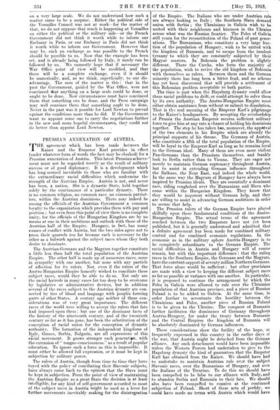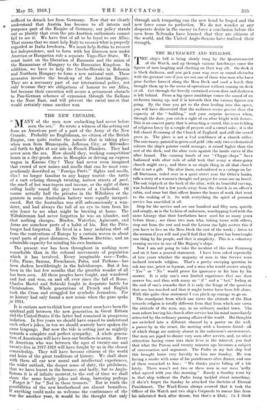PRUSSIA'S ANNEXATION OF AUSTRIA. T HE agreement which has been made
between the Kaiser and the Emperor Karl provides in effect (under whatever form of words the fact may be cloaked) for a Prussian annexation of Austria. This latest Prussian achieve" meat must not be regarded merely as the result of military success or of good diplomacy. It is a development which has long seemed inevitable to those who are familiar with the extraordinary racial difficulties which undermine the strength of the Austrian Empire. Austria is not, and never has been, a nation. She is a dynastic State, held together solely by the continuance of a particular dynasty. There is no common religion, no common race, no common patriot- ism, within the Austrian dominions. There may indeed be among the officials of the Austrian Government a common loyalty to the organization which provides them with pay and position ; but even from this point of view there is no complete unity, for the officials of the Hungarian Kingdom are by no means at one in their ambitions and outlook with those of the Austrian half of the Empire. Hungary, in fact, has many causes of conflict with Austria, but the two sides agree not to press their quarrels too far because each is necessary to the other as a bulwark against the subject races whom they both desire to dominate.
The Austrian-Germans and the Magyars together constitute a little less than half the total population of the Austrian Empire. The other half is made up of numerous races, some in sympathy with one another, but none with any particle of affection for its rulers. Nor, even if the rulers of the Austro-Hungarian Empire honestly wished to conciliate these subject races, would they be able to do so. Not only are the racial hatreds in many cases far too deep to be overcome by legislative or administrative devices, but in addition several of the races subject to the Austrian dynasty are con- nected by ties of blood and language with peoples forming parts of other States. A century ago neither of these con- siderations was of very great importance. The different races of the world were willing to accept the rulers that fate had imposed upon them ; but one of the dominant facts of the history of the nineteenth century, and of the twentieth century so far as it has gone, has been the substitution of the conception of racial union for the conception of dynastic authority. The formation of the independent kingdoms of Italy, Greece, Serbia, Bulgaria, are all expressions of this racial movement. It grows stronger each generation, with the extension of " tongue-consciousness," as a result of popular education. To ignore such a force as this is impossible. It must either be allowed full expression, or it must be kept in subjection by military power.
The rulers of Austria, though from time to time they have toyed with the policy of conciliating their Slavonic subjects, have always come back to the opinion that the Slays must be kept in subjection. From the point of view of maintaining the Austrian Empire as a great State the decision is at least intelligible, for any kind of self-government accorded to' most of the subject races in Austria might be used as a lever for tarther s movements inevitably -_making for the disintegration of the Empire. The Italians who are under Austrian rule are always 'looking to Italy ; the Southern Slays demand union with Serbia ; the Ukrainians in Galicia wish to be united with their neighbours and kinsmen in the Ukraine across what was the Russian frontier. The Poles of Galicia still yearn for the reconstitution 'of the Poland of past gener- ations. The Rumanians, who constitute a very large frac- tion of the population of Hungary, wish to be united with the kingdom of Rumania, and to escape from the insolent tyranny to which they are constantly subjected by their Magyar masters. In Bohemia the problem is slightly different. There the Czechs, who form the majority of the population, wish to revive the old kingdom of Bohemia with themselves as rulers. Between them and the German minority there has long been a bitter feud, and no scheme has yet been discovered that will provide a settlement of this Bohemian problem acceptable to both parties. The time is past when the Hapsburg dynasty could allow these racial problems to drift, or could attempt to solve them by its own authority. The Austro-Hungarian Empire must either obtain assistance from without or submit to dissolution. That is th,,, real meaning of the Emperor Karl's pilgrimage to the Kaiser's headquarters. By accepting the overlordship of Prussia the Austrian Emperor secures sufficient military force to give him at any rate a chance of holding his dominions together. The step he has taken has, moreover, the apprival of the two elements in his Empire which are already the principal supports of his throne. The Germans of Austria, who constitute a fifth of the total population of the Empire, will be loyal to the Emperor Karl as long as he remains loyal to the German ideal. Many of them are even more violent Pan-Germans than the Prussians themselves, and frankly look to Berlin rather than to Vienna. They are eager not merely to maintain German supremacy throughout Austria, but to assist in extending German influence throughout the Balkans, the Near East, and indeed the whole world. In the same way the Magyars of Hungary have always been inspired by Prussian ideals. They are essentially a dominant race, riding roughshod over the Rumanians and 'Slays who come within the Hungarian Kingdom. They know that they would be impotent without German help, aid they are willing to assist in advancing German ambitions in order to secure that help. The Prussian rulers of the German Empire have played skilfully upon these fundamental conditions of the Austro- Hungarian Empire. The actual terms of the agreement reached between the two Emperors have not yet been published, but it is generally understood and admitted that a definite agreement has been made for combined military control and for combined economic regulations. In the economic as in the military sphere Austria-Hungary is to be completely subordinate to the German Empire. The racial difficulties in Austria and Hungary will of course remain, but with this important difference : that the ruling races in the Southern Empire, the Germans and the Magyars, have the constant support of seventy million Northern Germans. That force alone would be sufficient ; but other provisions are made with a view to keeping the different subject races as far as possible at variance with one another. In particular, it is proposed to continue the arrangement by which the Poles in Galicia were allowed to rule over the Ukrainian population of that Austrian province, and a piece of Russian Poland is to be added to Galicia. At the same time, in order further to accentuate the hostility between the Ukrainians and Poles, another piece of Russian Poland is to be given to the Ukraine. The conquest of Rumania further facilitates the dominance of Germany throughout Austria-Hungary, for under the treaty between Rumania and the Central Empires the kingdom of Rumania will be absolutely dominated by German influences.
These considerations show the futility of the hope, se frequently expressed in this country in the earlier days of the war, that Austria might be detached from the- German alliance. Any such detachment would have been impossible unless the Western Powers had undertaken to give to the Hapsburg dynasty the kind of guarantees that the Emperor Karl has obtained from the Kaiser. We should have had to undertake to maintain Austrian rule over the subject Slavonic races, over the Rumanians of Hungary, and over the Italians of the Trentino. To do this we should have been compelled to be false to our alliance with Italy, and to abandon Serbia and Rumania to their fate. We should also have been compelted to connive at the continued subjection of Poland. Short of these acts of perfidy, we could have made.-no terms 'with. Austria which. would have sufficed to detach her from Germany. Now that we clearly understand that Austria has become to all intents and purposes part of the Empire of Germany, our policy stands out so plainly that even the pro-Austrian enthusiasts cannot fail to see it We have first of all to be loyal to our Allies. That means that we must help Italy to recover what is properly regarded as Italia Irredenta. We must help Serbia to recover her independence, and to form with her kinsmen now under Austrian or Hungarian rule a separate Yugo-Slav State. We must insist on the liberation of Rumania and the union of the Rumanians of Hungary to the Rumanian Kingdom. In addition, we have to help the Czecho-Slovaks in Bohemia and Northern. Hungary to form a new national unit. These measures involve the break-up of the Austrian Empire. They are a.necessary part of our international policy, not only because they are obligations of honour to. our Allies, but because their execution will secure a permanent obstacle to Pan-German schemes of expansion through the Balkans to the Near East, and will prevent the racial unrest that would certainly cause another war.



























 Previous page
Previous page